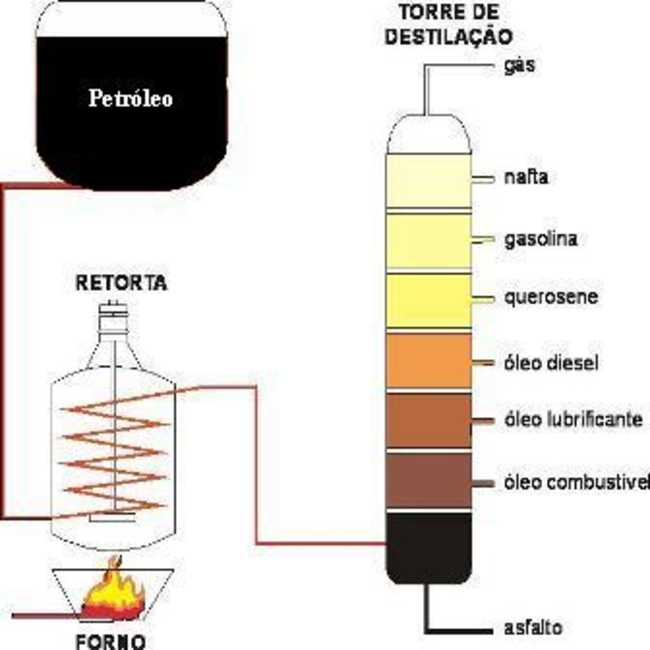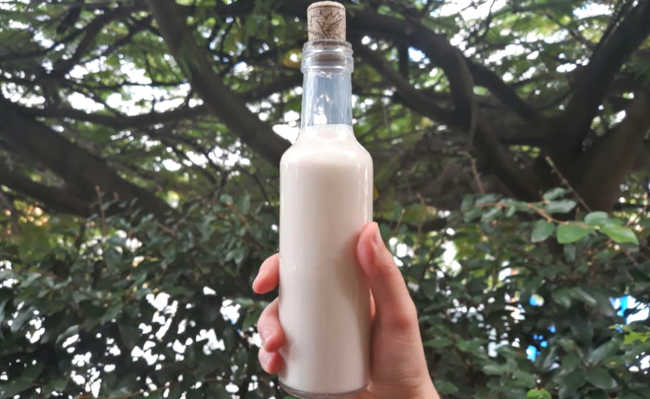What is mineral oil and what is it for?
Discover the pros and cons of different types of mineral oil and learn how to use them to your advantage

Edited and resized image by Dan Meyers is available on Unsplash
What is mineral oil?
Mineral oil, also known as base oil, liquid paraffin, white oil or liquid petroleum jelly, comes from petroleum. From the distillation of crude oil at atmospheric pressure, a complex mixture of hydrocarbons (paraffins, naphthalenes and various molecules consisting of carbons and hydrogens) is obtained, which is where mineral oil comes from (see the article on petroleum to learn more about).
The figure below briefly illustrates the oil distillation process and the products obtained from it.

Image: Infoschool
Classifications and uses
Mineral oil is used as a base for other products, being called base oils. Among them, there are two classes: lubricants and non-lubricants.
Lubricants:
Used as a base for engine oils, gear oils, transmission fluids, hydraulic fluids, among others. They have the characteristic of forming a protective film between two surfaces (both mobile or one fixed and one mobile), reducing friction between the parts.
Non-lubricating
They are widely used as base oils for sprays agricultural products, printing inks, tire oils, cosmetics, pharmaceuticals, food, etc.
Mineral oils are well known for their applications in cosmetics, medicines and foods. Due to these applications, we are constantly exposed to them, and this can influence our health negatively or positively.
- Substances to avoid in cosmetics and hygiene products
Benefits
With many medicinal applications and present as a base in many drugs, refined mineral oils can be very useful. Check out some features:
Laxatives
When ingested and reaching the intestine, mineral oil acts as a "lubricating barrier" in the bowel wall, thus having a laxative effect - often used to combat constipation and emptying the colon before examinations. Long-term use is not recommended, as mineral oil, when it is constantly present in the intestine, can irritate the intestinal mucosa and damage health.
skin hydration
Very present in cosmetics, the oil, when in contact with the skin, creates a protective layer that prevents the organ from drying out. It is widely used for dry skin treatments.
Dandruff treatment
Mineral oil is also used to treat dandruff and moisturize hair, also acting as a skin moisturizer, creating a layer that prevents the formation of dandruff and dryness of the scalp.
Drug base
They are widely used as bases for some medications, such as headache remedies (with acetaminophen) and Milk of Magnesia (Magnesium Hydroxide).
harm
As mineral oils are substances that are not naturally available to the environment and animals, they can end up interfering negatively with living organisms (and we humans are included there). Researches show that constant use and exposure to mineral oils can cause health problems, such as diseases caused by vitamin deficiencies, pneumonia and even cancer. Some inappropriate uses can also cause serious problems, such as injecting mineral oil into the muscle, a practice often performed by people who seek to have the “perfect body” - this attitude can cause serious inflammation to limb amputations and death.
Pneumonia
Research shows the relationship between mineral oil and pneumonia. Through the aspiration of vegetable oil, it can be deposited in the lungs and cause severe lung diseases (such as pneumonia) and, consequently, death.
Disability diseases
Some studies have indicated that the oral use of mineral oil can cause illnesses caused by deficiencies of provitamin A, and vitamins A, D and K, as the oil interferes with the absorption of these vitamins in the digestive tract, which interferes with the absorption of calcium and phosphorus .
Cancer
Mineral oil is strongly linked to an increased risk of developing cancer in animals. But there is also research on humans conducted at different times, which showed that workers in the metal production and aerospace industries, who were constantly exposed to mineral oil vapor, had an increased risk of developing cancer and some had testicular cancer. . Other studies show that the factor of its carcinogenic potential is the presence of polycyclic aromatic hydrocarbons (PAHs), which have a high carcinogenic potential.
muscle injection
In the search for the “perfect body”, many young people and adults try to use alternative means to speed up this process. Among false anabolic steroids, many inject mineral oil into muscle to make it grow and harden. When injected directly into the muscle, mineral oil infiltrates and accumulates, forming an abscess (accumulation of pus in a tissue), thus generating an inflammatory process that can lead to an infection. From there, the destruction of muscle tissue, necrosis, is caused. Depending on the level of necrosis, the only option is amputation. If the problem is not treated, it can lead to the individual's death.
Alternatives
As seen before, mineral oil can bring many health problems to human beings, especially if it is used constantly. To obtain the same effects as mineral oil, but minimizing the risks and damage caused by it, we can use other products.
As a means of moisturizing the skin and scalp, it is possible to use various vegetable oils that provide the same effect, but with much lesser health risks. Some vegetable oils are a good choice, such as:
- Green coffee oil;
- Grape seed oil;
- Almond oil;
- Jojoba oil;
- Rice vegetable oil;
- Copaiba oil;
- Coconut oil.
- Vegetable oils: extraction, benefits and how to acquire
- Tamarind;
- Castor oil;
- Almond oil;
- Guar gum;
- Hibiscus tea.
Incorrect disposal of lubricating oil can cause irreversible damage to health and the environment. Also know how to dispose of used or expired automotive oils.
The use of biodiesel is another alternative that can replace and prevent damage from the extraction and production process of mineral oil. See the full article about biodiesel.









